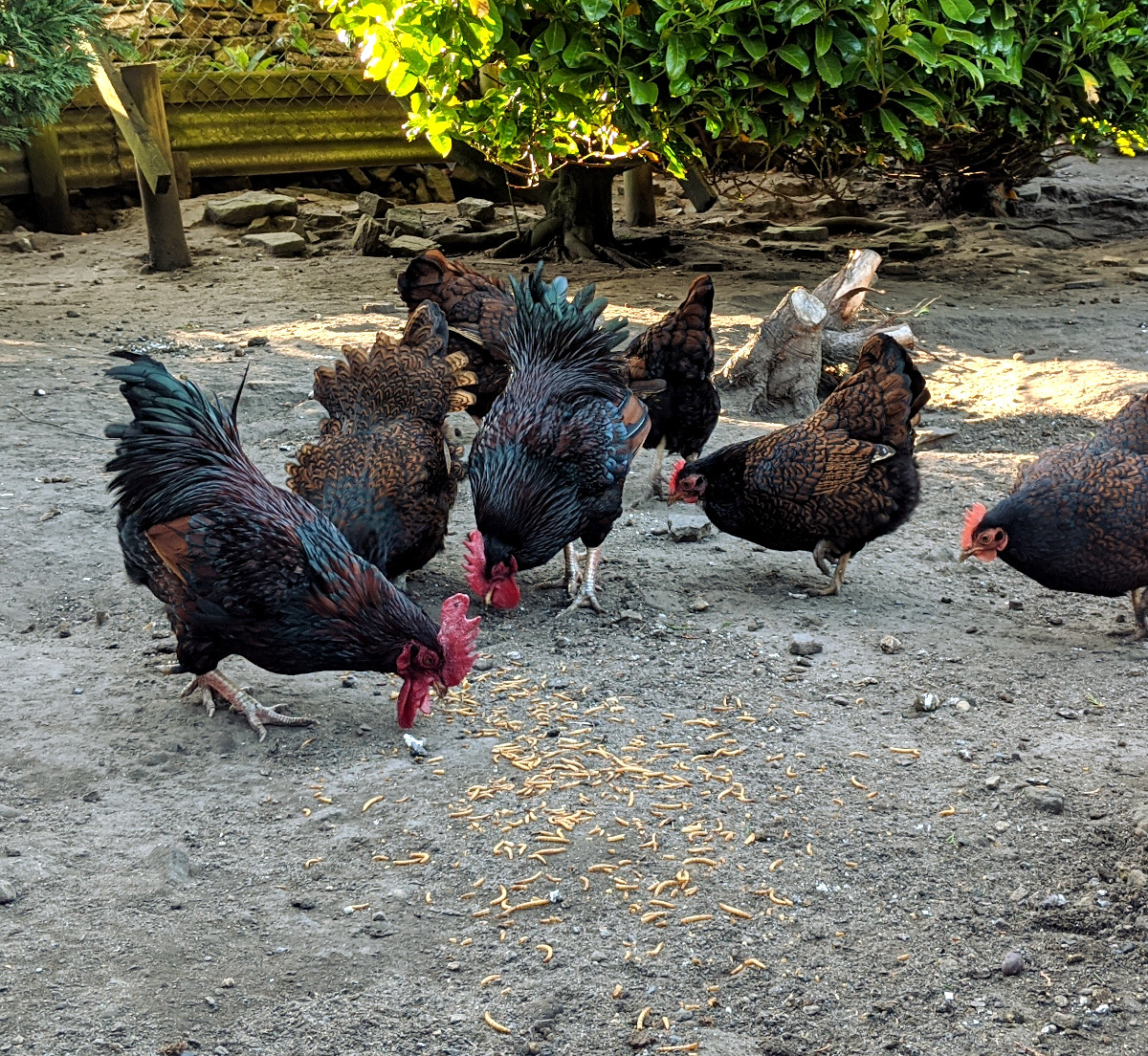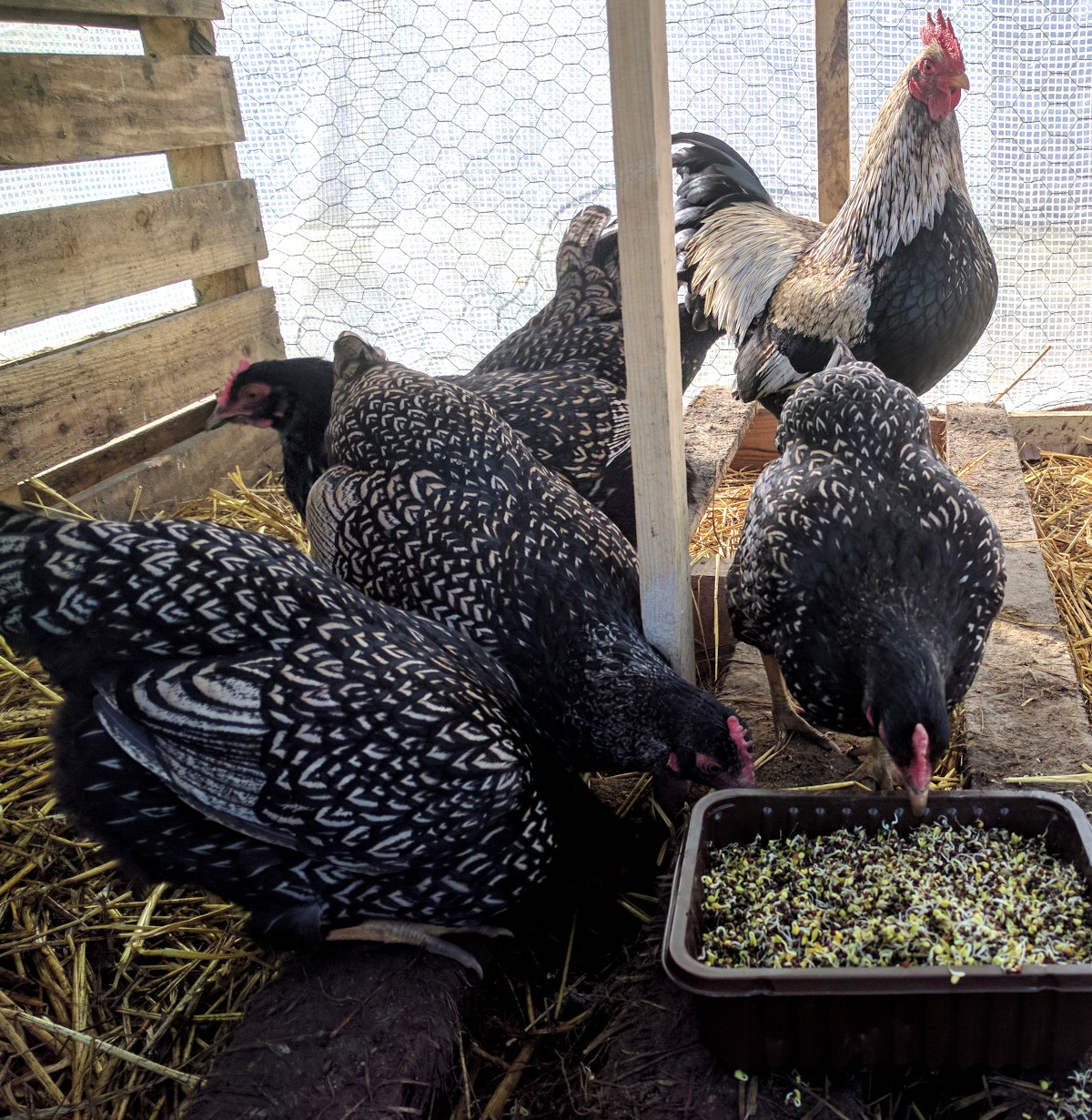
Feed, supplements and treats for show chickens.
Chickens, and indeed any show poultry must be fed the appropriate feed from the moment they hatch. The bulk of any chickens feed needs to be a complete ration appropriate the the age of the bird you are feeding.
Table of Contents
Any feeding problems can lead to checks in growth, developmental problems and discolouring of the feathers or barring of the sheen.
You do also need to be aware that there are certain things you are not allowed to feed to chickens in the EU and the UK. Meat, commercially produced insects, animal derivatives and kitchen waste are not permitted in chicken feed.
Do show chickens need different food?
Show birds are often fed a higher quality feed than standard hybrid laying hens and the feeding schedule is more complicated and more time and dedication is required.
When it comes to feeding breeding chickens I never feed below 20% protein and for show birds I give 26% protein or even more sometimes and remember, not all proteins are created equal.
As an example plant proteins are not equal to animal proteins and chickens have some amino acids that can only be derived from animal or insect sources.
Below: My show chickens get sprouts and seeds like hemp and sunflower.
These are often added into our mostly vegetarian rations by adding grated whole egg and insects like earthworms. Vegetable based protein feed is missing or deficient in 2 essential amino acid - lysine and methionine and these are added as additives to pelleted feed.
Keep a box of grit and oyster shell always before them and fresh water daily.
Be sure to not feed too much yellow grains like sweetcorn, corn or maize as it can make birds feathers "brassy" (yellowish hue).
What is the best chicken feed for show chickens?
Poultry fanciers are divided on what makes up the perfect diet for show chickens and if you visited 100 poultry fanciers you would likely get 100 different answers.
This is what and how I feed my show chickens:
- My morning feed is composed of mixed grains that have been fermented in summer and boiled in winter fed at the rate of an ounce per bird. These are easily digested and make an excellent start to the day, especially having a hot breakfast on cold winter mornings. The birds are then turned out to forage free range.
- At noon I feed mash with added hemp and shelled sunflower seeds, just what they will eat up clean in a short time.
- In the late afternoon they get standard chicken pellets with grated egg (shell and all).
- At night I feed my special blend of scratch feed, ad lib, as much as they could eat before going to roost for the night.
- In the winter when there is very little green food to be had I keep a whole kale plant, whole turnip or swede with greens still on or head of cabbage hanging from the ceiling by a string, just high enough that they have to reach well up for it.
- Confined birds need some greenery in their diet, and this can be in the form of sprouted grains, cut grass or clover or specially cultivated plants like turnip tops.
I keep log and compost piles so there are plenty of insects and earthworms in my pasture.
Do show chickens require supplements?
I use three supplements and the amounts added to the mash in the middle of the day:
- Dried seaweed (2%) is rich in trace minerals and iodine.
- Diatomaceous earth (2%) helps with digestion and pest control.
- Dried brewers yeast (2%) is rich in all the B vitamins and animal proteins.
Below: The list of nutrients in seaweed is impressive and it is 100% organic.
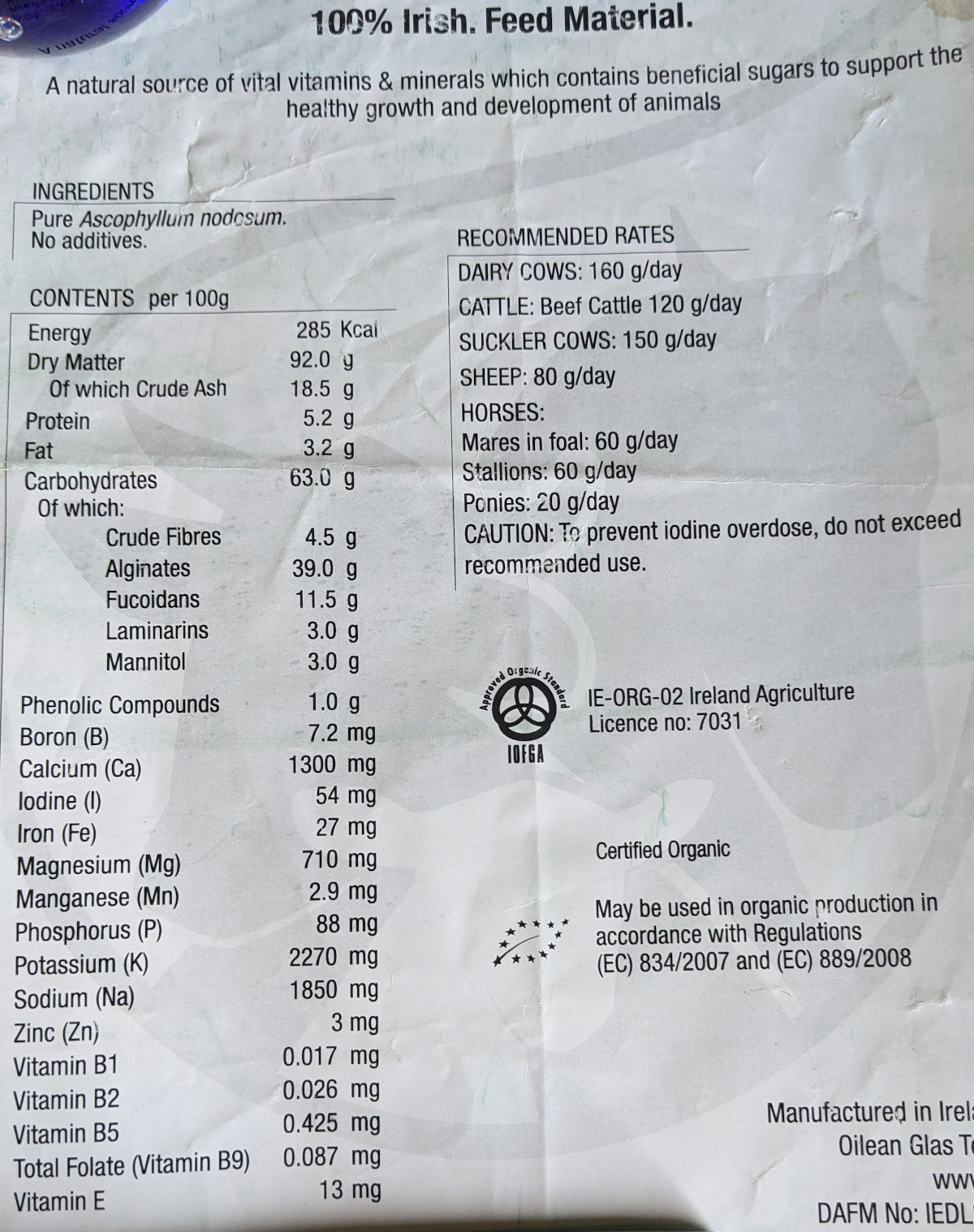
To unbalance a balanced ration with supplements is destructive action that can upset the digestion especially if you feed too much or too often.
Below: Highly coloured foods like carrots and pumpkins help with the skin and yolk colour in show chickens.
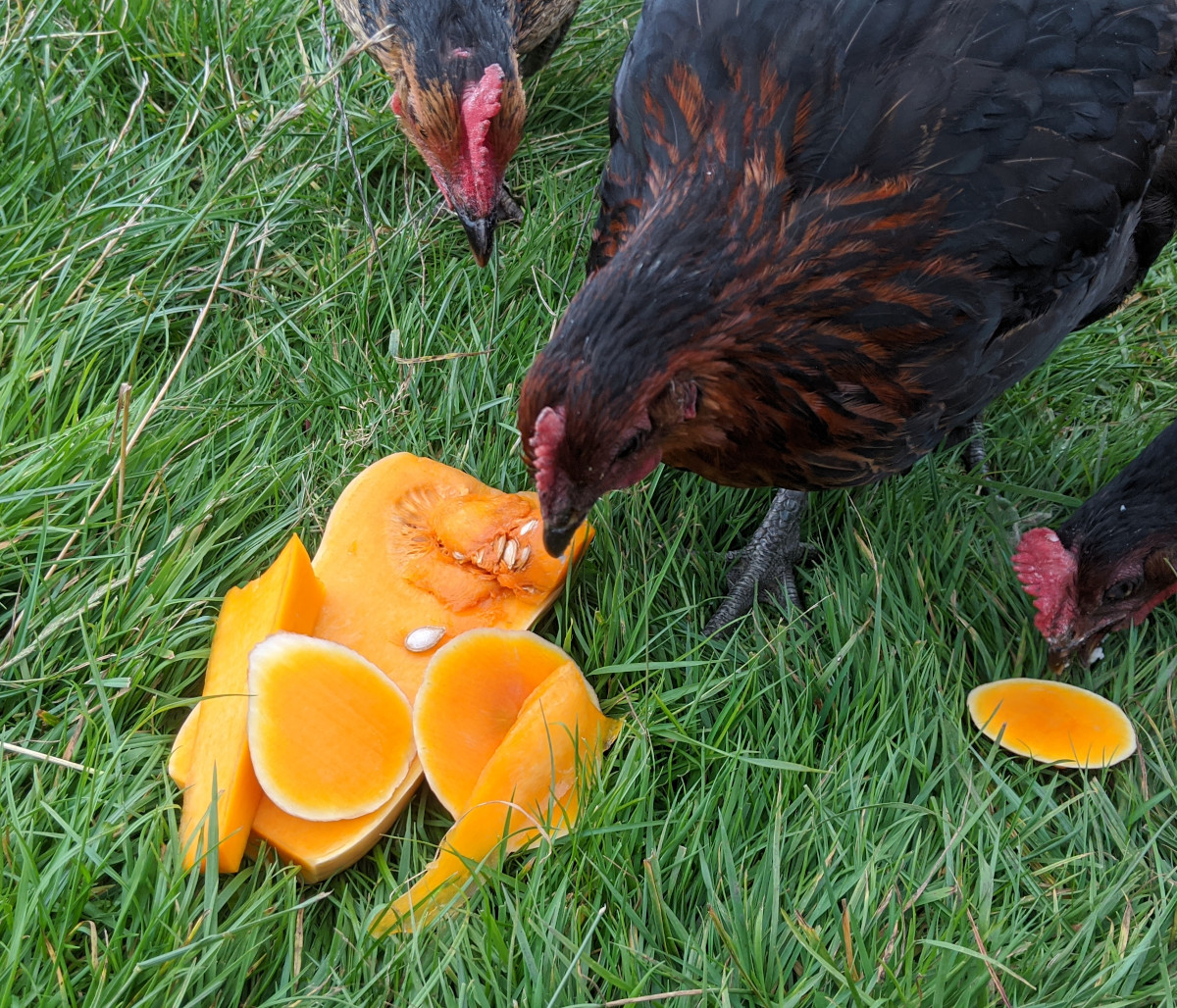
Some supplemental greens can be beneficial, intensifying the yellow colour in yellow skinned breeds.
Feeding for weight loss or weight gain in show chickens:
Each bird chosen for a show should be weighed once a week and the result noted in your records.
By altering the diet a bird can be made to gain or lose weight before the show although this is less effective in hens. Inside of thirty days it is quite possible to increase the weight of cockerels by as much as a two pounds and hens one pound.
If I find any birds that I intend to show not up to weight I begin to feed a little heavier and change the feed. Adding a tablespoonful of sugar for each bird into the mash and another into the water will cause rapid weight gain that can be reversed by stopping the sugar.
Below: Increasing the weight of chickens by adding high calorie feeds.
If you need to increase the weight still further you can add a slice of bread soaked in milk as an extra feed. The advantage of fattening a show bird a little is that is has a better feel in the judges hands while they are assessing the bird.
If you need to decrease the weight of a bird before a show you can remove sugars and carbohydrate from the diet and add protein and greens as well a restricting the diet a little in the middle of the day. Chickens being prepared for a show can be made to lose up to a pound in 30 days with no ill effects on their condition.
Should you change the diet before the show?
You should change a chickens diet as little as possible as it can upset digestion and cause soiling around the vent.
I do, however, switch over to more scratch in the three days before the show since it tends to make the chicken's poop more solid and easier to deal with.
You can add dried green peas or dried chopped carrots to the scratch to keep it more interesting for the birds.
Treats for show chickens:
Treats are an integral part of training show chickens. I never use fruit as treats for my chickens as it should never be a big part of their diet.
Here is a list of what I use to treat and train my show chickens:
- Shelled sunflower seeds.
- Meal worms or earthworms.
- Fresh green peas or fresh sweetcorn kernels.
- Safflower seeds.
Below: Meal-worms or earthworms make excellent treats for chickens.
